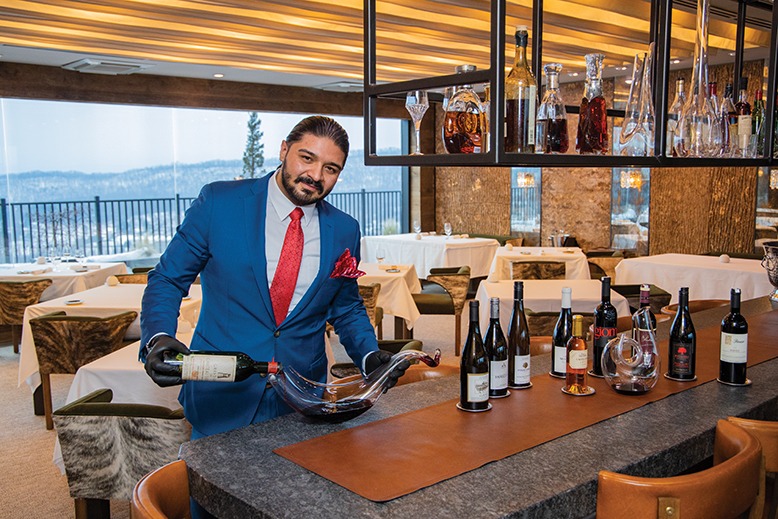
“Guests who want to dive into the experience are the most fun to have,” says Ken Rosado of Latour in Hamburg, decanting a fine Bordeaux. Photo by Joe Polillio
In restaurant parlance, the back of the house cooks the food and the front of the house serves it. They need each other, but they aren’t exactly co-equal, at least in terms of the public’s perception. Here is how Ken Rosado, a dining room captain and bartender at Restaurant Latour, the fine dining destination of the Crystal Springs Resort in Hamburg, puts it:
“I know wine, spirits, coffee and food. I’m very well-rounded. I’m the face of the experience. There’s an inner joy I get when I can make it memorable. But at the end of the day, it’s always the chefs and the food earning the recognition.”
Well, this month, we’re turning the tables, so to speak, to celebrate the front of the house. We rightly think of chefs and cooks as passionate, skilled and hardworking, on their feet all day. But so are the servers, and unlike the back of the house, they can’t curse and snarl because they’re onstage. You, dear restaurant-going reader, are no doubt the perfect customer, whom Rosado often sees at Latour and defines as follows:
“Culinary is their passion. They come for the experience. They ask questions, they want to understand everything about the food, the techniques, the ingredients, and the pairing of wine with food.”
Their polar opposite—seldom seen at the aerie that is the (pre-pandemic) 42-seat Latour, but familiar to Rosado, 30, from some of his previous posts—“is the type who is always looking to find fault. You’re having a good flow, but that one difficult table wants to ruin the night.”
Whether tables that repeatedly send things back, ask for extra this or that, or find fault when a water glass isn’t immediately refilled get their kicks from nitpicking is unanswerable. For front-of-house types like Rosado, the gauntlet, once thrown down, must be picked up, dusted off and gently returned.
“It’s up to us to keep our composure,” he says. “Every other table must have no idea what is going on, and we want to keep it that way.”
Rosado, like other front-of-house staff interviewed for this article, describes himself as a sports fan. This makes sense, because cooking and serving, like athletics, involve deep preparation, followed by the rush of GAME ON!
[RELATED: How Chefs Mastered Takeout Amid Covid-19]
“If I’m not talking about food, I’m talking about sports,” says Tommy Voter, 28-year-old operations director of chef Robbie Felice’s two restaurants, Viaggio in Wayne and Osteria Crescendo in Westwood. He plays point guard in basketball and center midfielder in soccer. “These are the positions that control the flow of the game,” he explains. “I’m always looking to pass the ball to set up a score. Being a manager is about directing people, setting them up to succeed.”

Anna Bischoff, right, general manager of Willow & Whisk in Wyckoff, goes over the day’s menu with server Lilly Fine. Every day is a new puzzle, making sure everybody is safe and we can still make money, Bischoff says. Photo by Joe Polillio
Opening a new restaurant in 2020, as Anna Bischoff did, may call for martial analogies. Willow & Whisk, a breakfast and lunch spot in Wyckoff, was supposed to open in March, but with construction shut down due to Covid-19 restrictions, did not open until July. Bischoff, 38, the general manager, says the hardest things have been “getting enough compostable to-go boxes and cutlery,” budgeting the cost of propane outdoor heaters at $250–$400 each, and monitoring the health of staff on a daily basis.
The restaurant’s well-staked tent, in the Boulder Run shopping center, blew over. The repairmen from the tent company did not wear masks. “I told them, ‘You have to wear masks,’” Bischoff says. “They were rude and awful, so we switched to another tent company.” Now, like many managers, she’s taking staff temperatures every day. “It’s been a wild ride.”
But Bischoff lives with it because “hospitality is in every bone in my body.” Growing up in West Virginia, she began working in restaurants at 14 as a dishwasher. But the kitchen wasn’t her magnet. “I have degrees in art history and German, but at some point, I realized I have a superpower,” she says. “My superpower is making people feel great.” That includes her staff—encouraging their questions and suggestions, looking after their health, and pooling all tips.
Covid-19 has changed the way front-of-house staff greet regulars. “You can’t hug them anymore, or even shake hands,” laments Voter, GM of Viaggio and Osteria Crescendo. “You just say, ‘Here’s your table,’ as you walk three feet in front of them.”
One of the joys of restaurant work pre-pandemic was going out with the gang after service. That’s dangerous now—and, with reduced hours, many workers can’t afford it. Coral Wang, a dining room captain at Heirloom Kitchen in Old Bridge, lives with her mother and five other family members. The mere fact of being in contact with the public several days a week “gives me this guilt and anxiety that I may get my mom sick.”
Some workers, despite all precautions, have suffered through bouts of Covid-19 These have cost them their senses of taste and smell, at least temporarily. Before he contracted Covid-19 in November, Rosado, the Restaurant Latour captain, prided himself on being able to identify any wine in a blind tasting as New World or Old World with a swirl, a sniff and a sip.
“Eight times out of 10 I’d nail it,” he says. “Now I’d fail. I’ve regained most of my sense of taste and smell, and I know I will eventually regain it all, but it will take a little time.”



